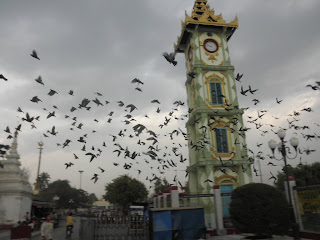- Burma was renamed Myanmar in 1989 by the military government
- Burma was first established as a nation during the golden age of Pagan in 1044 AD. Pagan was the first capital city of the country, and became the site of numerous grand temples and pagodas attesting to Burma's Buddhist history.
- In its expansionist phase, the British Government attempted to colonize Burma in the 19th century during three successive Anglo-Burmese wars over sixty years. Britain arrested the last of many Burmese kings in 1886 and considered colonization complete. Burma then became part of British India. The British further divided the numerous ethnic minorities in Burma by favouring some groups over others.
- In the 1920s, organized resistance against British rule began. By 1935 students at Rangoon University were part of an active movement for national independence under the exuberant leadership of U Aung San. With the outbreak of World War II, he and 29 of his supporters left Burma to undergo military training in Japan. In 1941, he returned as General Aung San and fought alongside the Japanese who invaded Burma, promising that Burma would be freed once the British were defeated. When General Aung San realized that the Japanese were less interested in Burma's freedom than Japan's victory over the British claim to Burma, he switched allegiances and negotiated an agreement with the British. The Japanese were expelled from Burma in 1945.
- Under the leadership of General Aung San terms for independence were established in 1947. While drafting a new constitution, however, he and several members of his new cabinet were assassinated in July. Burma finally became independent from Britain in 1948, with U Nu - a member of General Aung San's cabinet - as the first prime minister of Burma.
- Burma enjoyed democratic rule from 1948 to 1962 until General Ne Win, army chief of staff, took power in a coup d'état from Prime Minister U Nu.
- Severe political repression combined with steady economic decline, including the devaluation of currency (80% of private savings were rendered valueless in 1987), led to uprisings in 1962, 1974, and most recently 1988. On August 8, 1988 (8/8/88), students and supporters took to the streets in protest, calling for an end to military rule and the restoration of democracy in Burma. In response, the army killed thousands of unarmed civilians and imprisoned thousands more. Heeding this show of force, survivors went underground with their protest. Many fled to the borders where they joined ethnic groups which had been fighting for independence since before 1948.
- General Ne Win renamed his government the State Law and Order Restoration Council (SLORC) in the fall of 1988. Any opposition to his government was met with indiscriminate arrests; universities were closed; curfews were imposed; and meetings of three or more people were prohibited. SLORC continues to control public opinion by allowing only one newspaper and one radio station to operate in the entire country.
- In July 1989, Daw Aung San Suu Kyi - daughter of General Aung San and party member for the National League of Democracy (NLD) - was put under house arrest for speaking out against the SLORC government. In 1991, while imprisoned, she was awarded the Nobel Peace Prize. She was released in July 1995 and remains a critic of SLORC in Burma, though her movements are greatly restricted.
- In 1990, multi-party elections were held and the NLD won well over 80% of the seats, but SLORC denied power to the winning political party and imprisoned the elected members of parliament.
- Several hundred thousand Burmese civilians have crossed borders to seek safety in neighbouring countries. Ad hoc refugee camps have been established along the Thai-Burma border to assist those seeking safety. Thousands more Burmese are displaced within the country. It is estimated that one in twenty Burmese people are forced to leave their homes, either to find safety in neighbouring countries or become internally displaced persons (N.I., 1996: 19). Most of the Burmese newcomers to BC fled their homes during the 1988 uprising, became temporary refugees in Thailand, and have since been granted permanent immigration status in Canada.

0 Responses so far.
Post a Comment